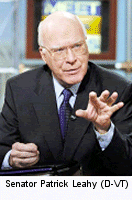Democrats Introduce Bills To Combat War Profiteering
 In yet another sign that a change has come to Capitol Hill in the form of a Democratic Congress that actually works for a living, Senator Patrick Leahy (D-VT), the new Chairman of the Senate Judiciary Committee, has introduced two bills to crack down on the war profiteers who have been fed so much money by the Bush administration.
In yet another sign that a change has come to Capitol Hill in the form of a Democratic Congress that actually works for a living, Senator Patrick Leahy (D-VT), the new Chairman of the Senate Judiciary Committee, has introduced two bills to crack down on the war profiteers who have been fed so much money by the Bush administration.Leahy wasted no time on the very first day of the 110th Congress last week in proposing both S.118, the Effective Corruption Prosecutions Act of 2007 and S. 119, the War Profiteering Prevention Act of 2007.
"Last year, despite the mounting evidence of widespread contractor fraud and abuse in Iraq, the Republican-controlled Senate would not act on it," said Leahy, in re-introducing the War Profiteering Prevention Act on the Senate floor. "Instead, the Congress took a terrible misstep in seeking to end the work of the Special Inspector General for Iraq Reconstruction."
That bill, written "to prohibit profiteering and fraud relating to military action, relief, and reconstruction efforts," is cosponsored by 12 other Senators -- all Democrats -- and has been referred to the Senate Judiciary Committee, which is now under the control of Leahy himself. This means that cracking down on the likes of Halliburton and Bechtel for cheating the troops and ripping off the American taxpayer will actually get a hearing, instead of being killed, as it was under Republican rule.
Here's Leahy on the Senate floor last week:
"Last year, the Special Inspector General for Iraq Reconstruction found that millions of U.S. taxpayer funds appropriated for Iraq reconstruction have been lost and diverted. Yet we continue to send more taxpayer funds to Iraq, without accountability.Leahy's legislation, which in the past never stood a chance with the war profiteers themselves providing financial backing for the Republican Congress, would accomplish some of the following goals:
"Too much of this money is unaccounted for, and many of the facilities and services that these funds were supposed to pay for are still nonexistent. We in Congress must ask--where did all the money go? We need to press for more accountability over the use and abuse of billions of taxpayers' dollars sent as development aid to Iraq, not less.
"A new law to combat war profiteering in Iraq and elsewhere is sorely needed and long overdue."
- Criminalize war profiteering, which is defined as materially overvaluing any good or service with the specific intent to excessively profit from the war and relief or reconstruction activities.
- Strengthen the tools available to federal prosecutors to combat war profiteering by providing clear authority for the Government to seek criminal penalties and to recover excessive profits for war profiteering overseas.
- Prohibit any fraud against the United States, Iraq, or any other foreign country involving a contract for the provision of any goods or services in connection with a war, military action, or relief or reconstruction activities.
- Prohibit making a false statement in any matter involving a contract for the provision of any goods or services in connection with a war, military action, or relief or reconstruction activities.
Leahy's Effective Corruption Prosecutions Act of 2007, cosponsored so far by Mark Pryor (D-AR), is another anti-corruption measure designed specifically to give federal prosecutors the tools to aggressively prosecute companies and individuals who attempt to illegally profit from America's wars.
"If we are serious about addressing the egregious misconduct that we have recently witnessed, Congress must enact meaningful legislation to give investigators and prosecutors the resources they need to enforce our public corruption laws," said Leahy. "I strongly urge Congress to do more to restore the public's trust in their government."
The legislation would do much to broaden the power of prosecutors to try war profiteers, including extending the statute of limitations for the most serious public corruption offenses and authorizing $25 million over each of the next four years to give federal investigators and prosecutors greater resources to go after public corruption.
While the Bush administration has had well-known improprieties going on with defense contractors in Iraq and they have been subject to tremendous public criticism for things like a no-bid procurement process for Dick Cheney's boys at Halliburton, the Republican Congress added this to the long list of things ignored and deemed unworthy of an ounce of oversight on their watch.
But Leahy makes it very clear that, on the powerful Judiciary Committee, a new day has indeed dawned.
“Americans want the culture of corruption to end. From war profiteers and corrupt officials in Iraq, to convicted Administration officials, to influence-peddling lobbyists and, regrettably, even members of Congress, too many supposed public servants have been serving their own interests, rather than the public interest,” he said. "The American people staged an intervention during the November elections and made it clear that they would not stand for it any longer. They expect the Congress to take action, and these bills are a good first step toward meeting that call.”

















<< Home